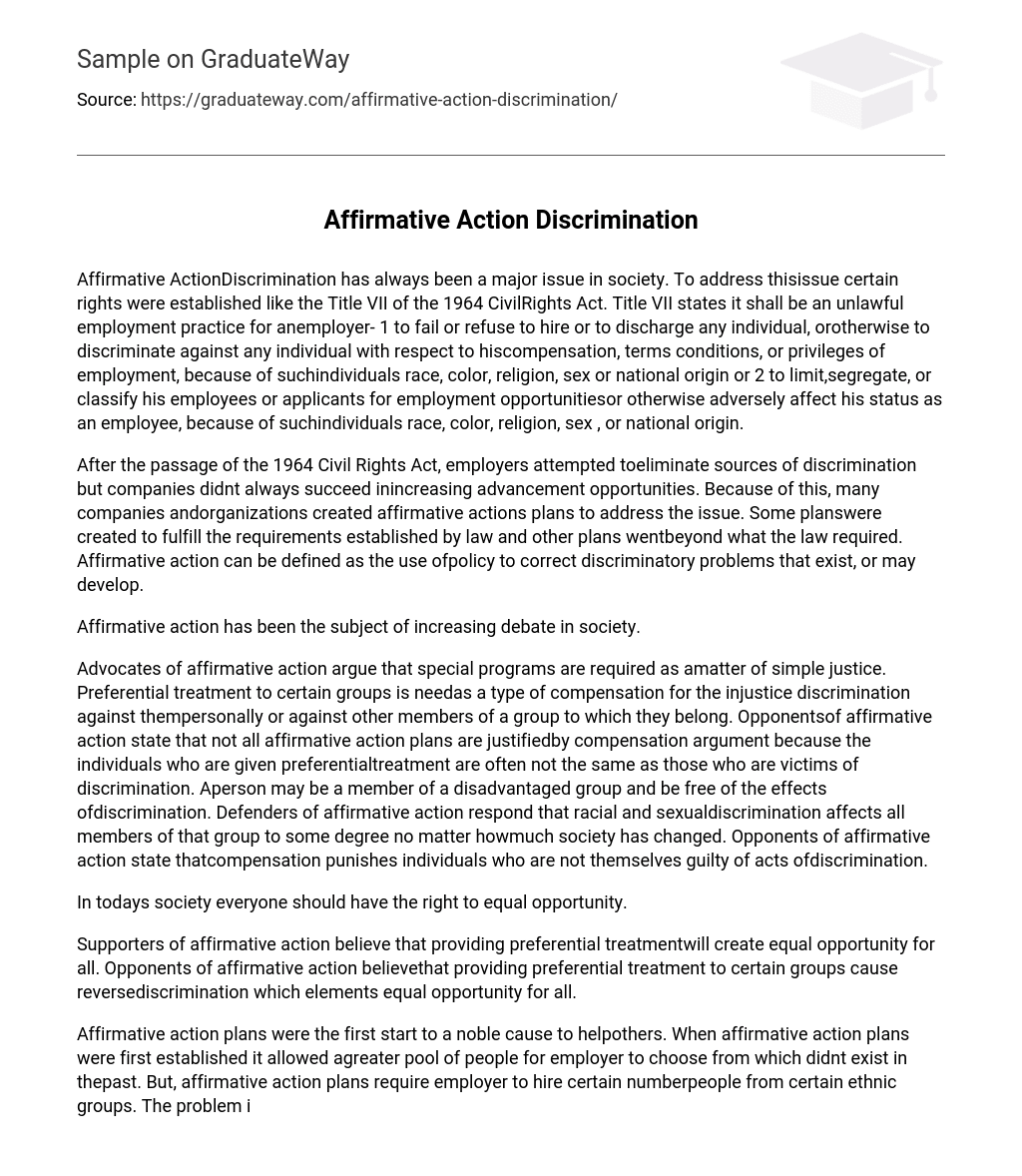Affirmative ActionDiscrimination has always been a major issue in society. To address thisissue certain rights were established like the Title VII of the 1964 CivilRights Act. Title VII states it shall be an unlawful employment practice for anemployer- 1 to fail or refuse to hire or to discharge any individual, orotherwise to discriminate against any individual with respect to hiscompensation, terms conditions, or privileges of employment, because of suchindividuals race, color, religion, sex or national origin or 2 to limit,segregate, or classify his employees or applicants for employment opportunitiesor otherwise adversely affect his status as an employee, because of suchindividuals race, color, religion, sex , or national origin.
After the passage of the 1964 Civil Rights Act, employers attempted toeliminate sources of discrimination but companies didnt always succeed inincreasing advancement opportunities. Because of this, many companies andorganizations created affirmative actions plans to address the issue. Some planswere created to fulfill the requirements established by law and other plans wentbeyond what the law required. Affirmative action can be defined as the use ofpolicy to correct discriminatory problems that exist, or may develop.
Affirmative action has been the subject of increasing debate in society.
Advocates of affirmative action argue that special programs are required as amatter of simple justice. Preferential treatment to certain groups is needas a type of compensation for the injustice discrimination against thempersonally or against other members of a group to which they belong. Opponentsof affirmative action state that not all affirmative action plans are justifiedby compensation argument because the individuals who are given preferentialtreatment are often not the same as those who are victims of discrimination. Aperson may be a member of a disadvantaged group and be free of the effects ofdiscrimination. Defenders of affirmative action respond that racial and sexualdiscrimination affects all members of that group to some degree no matter howmuch society has changed. Opponents of affirmative action state thatcompensation punishes individuals who are not themselves guilty of acts ofdiscrimination.
In todays society everyone should have the right to equal opportunity.
Supporters of affirmative action believe that providing preferential treatmentwill create equal opportunity for all. Opponents of affirmative action believethat providing preferential treatment to certain groups cause reversediscrimination which elements equal opportunity for all.
Affirmative action plans were the first start to a noble cause to helpothers. When affirmative action plans were first established it allowed agreater pool of people for employer to choose from which didnt exist in thepast. But, affirmative action plans require employer to hire certain numberpeople from certain ethnic groups. The problem is not hiring a variety of peoplefrom different ethnic groups. The problem begins when a person who is bestqualified for a job, loses the position to someone less qualified.
People against affirmative action believe that not only does it hurt whitemales it’s also causes problems among the protected classes that its supposedto be helping.
Many people feel that it is an insult that the government thinks they needspecial help to compete in the job market. To them acceptances to specialtreatment is an admittance of inferiority. Others would be extremely offended ifthis help was taken away from them. They think without affirmative action theywouldnt be able to get the job. People who oppose affirmative action believethat some minorities use it as a crutch, which produce less qualified candidatesin job market.
Ethically is affirmative action the right decision for attempting to elementdiscrimination? When answering this question you really need to take theintegrated approach because discrimination has been major issue for so long itsimport review all areas, the economical, legal, and moral. Affirmative actionplans and quotas have direct and indirect costs of imposing them and complyingwith and the costs are not cheap. The money that was used for affirmative actionplans and quotas could have gone to the economy. Affirmative actions hurtseveryone by hurting the economy. Legally its required by law to treateveryone equally, affirmative action plans were created to assist in thisprocess but some plans go beyond what is required by the law. So is thatillegal? Morally affirmative action plans were created to right the wrongs ofthe past. But is it right to be unfair to individuals that were not even bornwhen discrimination was allowed. Morally everyone should be treated equally.
After reviewing the integrated approach to ethical decision-making Imagainst affirmative action. I feel it hurts the economy because it only benefitscertain groups and doesnt benefit society as a whole. Legally in the past itwas the right thing to do, but affirmative action is definitely not the answerfor equality in this day and time. Affirmative action has balanced for manyyears on moral threat. It’s know time to apply new moral threats, not towardsthe employers and colleges but towards the government. The government needs totake action towards the real problems of equality: poverty and the lack ofproper education. We need a variety of different programs to assist both lowerand middle class of any minorities and whites on the basis of their economicstatus and not their race.
I’m considered a minority as a woman and I was also a part of the lower classwhile growing up. I didnt receive any preferential treatment. I was broughtup to believe that the world doesnt owe me just because there are otherpeople better off then me. I believe that you have to work hard to achieve yourgoals. Affirmation action plans I feel hands minorities their goals instead ofmaking them work hard to achieve them. I also believe affirmative action createsthe attitude in minorities that the world owes me.
Category: Philosophy





